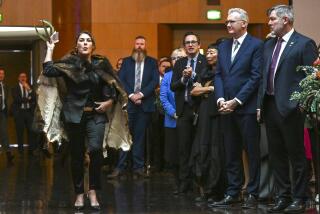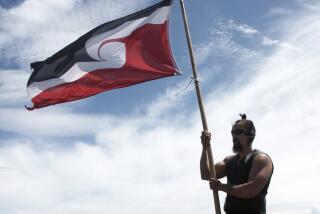A WORLD REPORT SPECIAL EDITION ON THE PACIFIC RIM : THE SOUTH RIM : the LOW-down
- Share via
AUSTRIALIA
AUSSIE-TALK
Although English is the official language of Australia, there is also a lingo that the locals call Aussie-speak and the Britons label strine, a jab at the Australian accent. Some examples from the Outback, or rural reaches of the continent: “Stations”/ranches “Squatters”/ranchers “Mob”/herd of animals “Beyond the black stump”/far from the city “Blood worth bottling”/words of praise “Stone the crows”/expression of surprise “Fair dinkum”/honest or genuine “Hooroo”/goodby
“You’ll come a’waltzing, Matilda, with me.” Many foreigners first encounter Australian slang in the country’s unofficial anthem, “Waltzing Matilda,” which was written 100 years ago last week. It’s the story of a swagman, a vagrant, who carried his possessions in a blanket, or Matilda, tied to his back. The song is “part and parcel of whatever we are as Australians,” says Prime Minister Paul Keating.
The offical anthem is “Advance Australia Fair.”
LAND AND PEOPLE
Aborigines and the Torres Strait Islanders are thought to have inhabited Australia for as long as 60,000 years. After Australia (from the Latin australis, southern) was claimed as British territory by Captain James Cook in 1770, thousands of Aborigines were killed. As late as the 1960s, government policies to protect aboriginal land rights were poorly enforced. A 1992 census counted 265,459 Aborigines and Torres Strait Islanders, which is 1.6% of Australia’s total population of 18 million.
Meanwhile the immigrant population of the country has climbed steadily over the centuries. Some of the first to arrive were prisoners of the English Crown. In recent decades the Asian population has grown significantly.
Australia is about the size of the contiguous United States and has a population of 18 million. It is the driest of the world’s continents.
ON SCREEN
A number of top film actors hail from Australia and New Zealand.
Dame Judith Anderson, actress, hallmark film “Rebecca”/Born Adelaide, Australia (1898-1992)
Errol Flynn, actor, “The Adventures of Robin Hood”/Born Hobart, Tasmania, Australia (1909-1959)
Paul Hogan, actor, “Crocodile Dundee”/Born Lightning Ridge, Australia, 1941
OPERA
The Sydney Opera House: signature of the Sydney skyline, an imposing structure featuring a series of half domes opening onto the harbor at Bennelong Point. Designed by Danish architect Bjorn Utzon. The building, which was officially opened to the public in October, 1973, contains a concert hall and two theaters.
DIVAS
Joan Sutherland (1926-), born in Sydney, performs in Wagner’s Ring Cycle
Nellie Melba (1861-1931), born near Melbourne, performed in London and New York, sang Mimi in “La Boheme”
SOUNDS
* Little River Band, Air Supply, Men at Work, Midnight Oil, INXS
* Olivia Newton-John, Helen Reddy, Peter Allen
TOURISM
Visitors to Australia, 1994: 1. Japan (720,900) 2. New Zealand (480,200) 3. Britain (334,900) 4. United States (289,500) 5. Singapore (187,500) 6. Taiwan (142,500) 7. Germany (122,600) 8. Korea (110,700) 9. Hong Kong (109,400) 10. Indonesia (105,600) *
Travel destinations for Australians 1. New Zealand (353,300) 2. United States (288,300) 3. Britain (254,500) 4. Indonesia (214,200) 5. Hong Kong (130,400) 6. Singapore (91,700) 7. Malaysia (84,500) 8. Fiji (82,900) 9. Thailand (72,100) 10. Philippines (47,300) Source: The Australian Bureau of Statistics
SPORTS
Greg Norman, golf
Evonne Goolagong, tennis
Margaret Smith, tennis
Pat Cash, tennis
Lew Hoad, tennis
Rod Laver, tennis
John Newcombe, tennis
Ken Rosewall, tennis
Dawn Frasier, swimming
Murray Rose, swimmer
Herb Elliott, runner
John Bertrand, yachting
Don Bradman, cricket
Ian Chappel, cricket
Greg Chappel, cricket
Pam Burridge, surfing
Nat Young, surfing
ETC. * Australia is home to 400 species of birds found nowhere else, from the honeyeater to the flightless emu. * The average Australian woman has a life expectancy of 80 years, six more than the average man. * Australia has one of the world’s lowest rates of population density: six inhabitants per square mile.
NEW ZEALAND
*
TOURISM
Visitors to New Zealand: 1994 1. Australia (398,957) 2. United States (161,427) 3. Japan (151,555) 4. Britian (131,583) 5. Canada (30,744)
Sources: “Statistics New Zealand,” 1994 *
Land and People
Way Down Under, more than 1,000 miles southeast of Australia, across the Tasman Sea, New Zealand--the North and South Islands and a chain of smaller ones--is considered the world’s most isolated economically advanced nation.
Twelve percent of its people are Maoris, descendants of the original Polynesian inhabitants. Most of the other New Zealanders are of European stock, primarily British. Some land disputes remain between the two groups, but the Maoris accepted British sovereignty of the islands in the 1840 Treaty of Waitangi.
*
ETC. - New Zealanders eat more bananas per household than any other country on Earth. * Citizens of New Zealand and Australia are among the world’s top foreign travelers. - New Zealanders invented the bobby pin, postage stamp vending machine, baggage carousel, jet boat, bungee jumping and Velcro. - Ernest Rutherford, A New Zealander, was the first person to split the atom in 1919. Ironically, New Zealand remains nuclear-free. - New Zealand has the greatest number of golf courses and bookstores of any country in the world--one of each for every 7500 people. *
SPORTS
Edmund Hillary, mountaineer
Bob Charles, golf
John Walker, runner
Peter Snell, runner
Peter Blake, yachting
John Reid, cricket
Analise Coberger, skiing
Compiled by Times researcher LAURA GALLOWAY
Sources: “Australia in Brief,” “New Zealand Facts”
More to Read
Sign up for Essential California
The most important California stories and recommendations in your inbox every morning.
You may occasionally receive promotional content from the Los Angeles Times.










